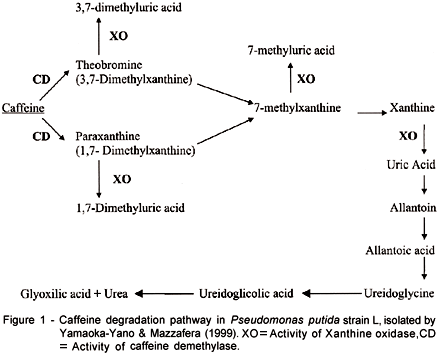Coffee husk and coffee pulp are coffee processing by-products. Coffee husk is obtained when harvested coffee is processed by the dry method, and coffee pulp is produced by the wet method. In Brazil, coffee is usually processed by the dry method, therefore an expressive amount of husk is obtained every year. Some of the husk is used as organic fertilizer but, other applications are very limited, mainly because it is a bulky product. The presence of tannins and caffeine diminish acceptability and palatability of husk by animals. This review discuss degradation of caffeine by microorganisms, with special attention to bacterial, biological decaffeination of coffee husk and pulp and its subsequent use on animal feeding. The known biochemical routes of caffeine degradation by microorganisms are initially discussed; problems concerning physiological effects in animals, focusing on the limitations imposed by caffeine as an antiphysiological component are raised; the use of microorganisms to decaffeinate coffee husk and pulp is discussed. The discussions offer a view on decreasing caffeine content of coffee husk and pulp, which would allow the use of larger amounts of these products in animal feeding, partially replacing traditional components such as cereal grains.
Pseudomonas; coffee husk; decaffeination



